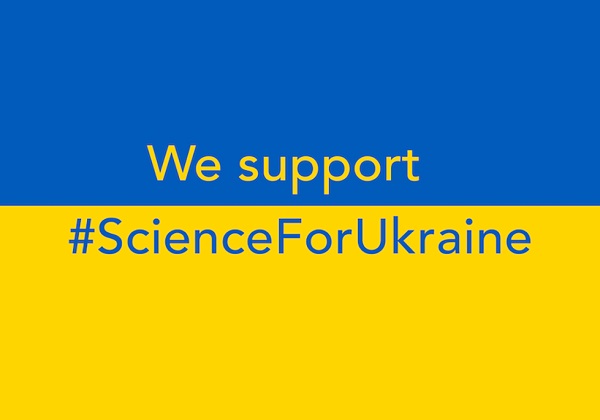 Credit: C2DH
Credit: C2DH
The Luxembourg Centre for Contemporary and Digital History (C2DH), one of three interdisciplinary research centres at the University of Luxembourg, recently announced that it had joined #ScienceForUkraine, an initiative of volunteers which collects and disseminates information about support opportunities for scholars fleeing Ukraine.
Speaking to Chronicle.lu, Dr Marten Düring, national coordinator of #ScienceForUkraine for Luxembourg, described the initiative as "a rapidly growing network of scholars which volunteer to collect and disseminate information on opportunities for Ukrainian scholars worldwide".
Set up just three weeks ago in response to the war in Ukraine, the network now counts more than 80 members and lists more than 800 work opportunities for researchers. Members of the network share tasks such as collecting information about support opportunities on a national level, lobbying for the creation of additional opportunities, aggregating this information in a central databse, disseminating it within the Ukrainian research community via social media and person-to-person exchanges and actively collaborating with similar initiatives. "Finally, through direct contacts with members of the Ukrainian scientific community, Science for Ukraine collects valuable information on the concrete needs of the Ukrainian student and research community", noted Dr Düring.
Fellowships
As part of this initiative, the C2DH has made available funds to support four six-month fellowships, in the domains of History, Digital Humanities, Design and Software Development. Dr Marten Düring, who is an Assistant Professor and Senior Research Scientist at the C2DH, explained: "We joined and support Science for Ukraine since its efforts to collect and publish information on support opportunities complement effectively other long-standing initiatives such as Scholars at Risk" – Scholars at Risk is an international network of higher education institutions aimed at promoting academic freedom and protecting threatened scholars.
Regarding the fellowships currently on offer, Dr Düring explained that the C2DH had "repurposed its visiting fellowship programme for international scholars which intends to foster exchange and mutual learning". He elaborated: "Our priority under these circumstances is to offer help and some form of stability and to respect the extraordinary and often very difficult situations in which our colleagues find themselves at the moment".
Dr Düring confirmed that the C2DH is currently processing five applications which were submitted "within days" of the announcement. The aim is to "welcome the first fellows in the next two to three weeks". These applicants have either expressed an interest in joining existing research projects at the C2DH or pursuing their own research projects during their stay in Luxembourg.
"Visiting fellows generally receive a monthly allowance to cover costs for living and accommodation", added Dr Düring. "From exchanges with colleagues in other reseach institutions within Luxembourg and abroad we know that the scarcity of accommodation is currently the most important limiting factor and poses the biggest obstacles".
Other Luxembourg partners
Dr Marten Düring cited several other national research centres which have launched similar initiatives, namely the Luxembourg National Research Fund (Fonds National de la Recherche - FNR), the Luxembourg Centre for Systems Biomedicine (LCSB), the Luxembourg Institute of Health (LIH), the Luxembourg Institute of Science and Technology (LIST) and the Luxembourg Institute of Socio-Economic Research (LISER).
"We are now in the process of aligning and coordinating our efforts", he explained. "The university has established a task force in which representatives of all research centres will exchange and coordinate their initiatives in the near future, I will represent C2DH there".
Future action
Regarding the potential for future fellowships at the C2DH as part of #ScienceForUkraine, Dr Marten Düring said: "As a research institution we are monitoring the emerging support needs of students and researchers also through our engagement with Science for Ukraine and will collaborate closely with the support activities of the FNR, the university administration and the Luxembourgish government". He continued: "For the forthcoming fellowships we will offer individual mentoring. Depending on how the now highly uncertain situation in Ukraine evolves, the C2DH is prepared to offer more fellowships in the next year".
Dr Düring concluded by stressing that the main short-term priorities for the C2DH were accommodation and simplified administrative procedures "which take into account the situation of researchers and students which find themsleves under considerable stress, with limited access to internet and IT hardware and are potentially confronted by language barriers and without access to the official documentation of past studies and degrees they obtained".
In the medium term, students from Ukrainian universities (regardless of nationality) will require "tuition-free access to study places so that they can graduate either through remote or on-site teaching". Dr Düring continued: "Like all professionals, Ukrainian researchers need positions and especially male researchers who are currently restricted from leaving the country are actively looking for opportunities for remote work".
Based on data from the Ukrainian Ministry of Science and Education, there were 60,000 researchers and 35,000 support staff as well as 1.7 million students in Ukraine in 2021.









